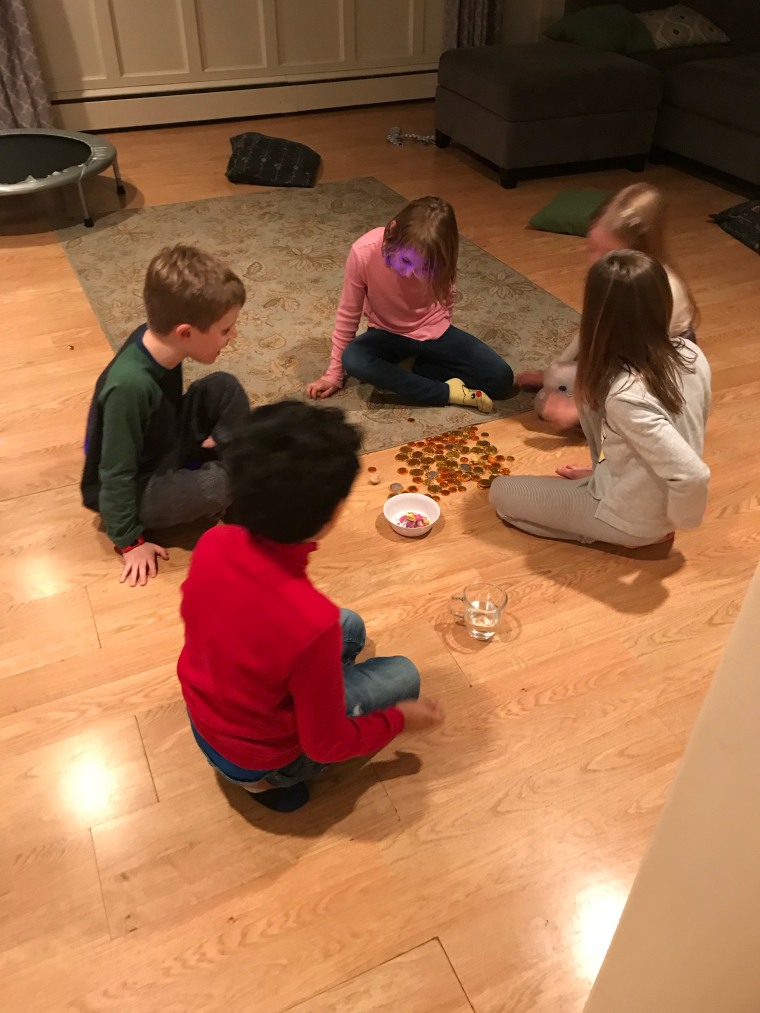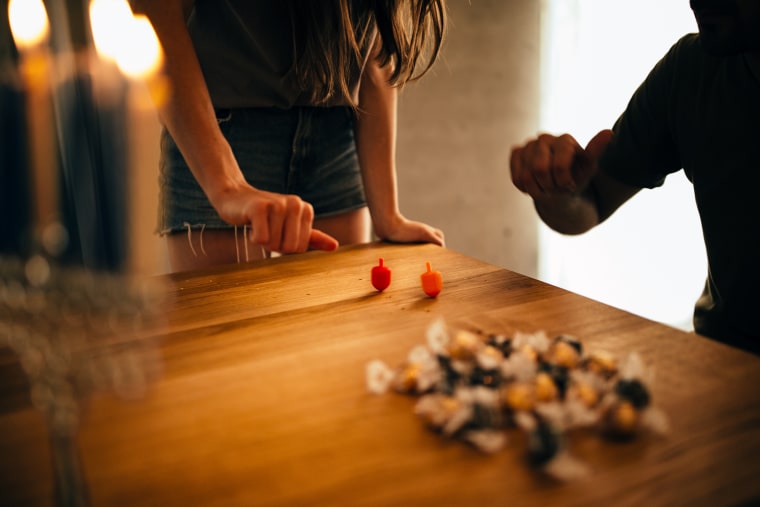Ah, the holidays. It's the most wonderful time of the year — unless you don’t celebrate Christmas and your kids are old enough to understand that everyone else is getting visits from Santa and presents under the tree.
Ever since our now eight-year-old twins were babies, we have tried to make our holiday — Hanukkah — fun and enjoyable for them. As Jews, we light the candles on the menorah each night, exchange gifts and fry up some pretty amazing potato latkes to commemorate the small drop of oil for the menorah in the ancient temple that miraculously lasted eight days (or as Adam Sandler would say, eight crazy nights).
As cool as that sounds, it’s still hard to measure up against the over-the-top images of Christmas we’re bombarded with starting in October. From the twinkling trees to the idea of bounding down the stairs to see what Santa brought, there’s no way Hanukkah can compete, nor should it. I’ve always been adamant that we not try to create a Jewish version of Christmas for our kids. (There's a reason there's a book called "There’s no such thing as a Chanukah bush, Sandy Goldstein"). What we can do is celebrate our own holiday for what it is and share that with our friends — even the ones who don’t celebrate it.
I’ve always been adamant that we not try to create a Jewish version of Christmas for our kids. What we can do is celebrate our own holiday for what it is and share that with our friends.
Rachel Annunziato, Ph.D., professor of psychology at Fordham University, told me that I’m on the right track by showing my kids how to be proud of our heritage and celebrate our holiday — even if it’s not the popular one.
“Teaching our kids about these traditions cultivates a sense of family, community and pride,” Annunziato told me. “It can also be helpful to focus on excitement besides gifts, such as the chance to give or be with others.”
I loved the idea of sharing our holiday with the community and focusing more on togetherness. Last December, still the newbies in our new town, we invited some friends over for a Hanukkah party, a tradition we had carried out in our old home with old friends. And while I couldn’t offer my kids chestnuts roasting on an open fire (I mean, that sounds dangerous anyway) or fruitcake (does anyone really want fruitcake?) what I could do was share our own happy traditions and if all else failed, let them have a Kidz Bop dance party.
“We live in a beautifully multicultural world and allowing our kids to be exposed to other religions and cultures is such a wonderful way for our children to engage in it,” Annunziato told me. “It’s also so helpful for perspective-taking and cultivating empathy. Recently, in my role as a college dean, I was reading materials on Gen Z and it was mentioned that adjusting to diversity in the college setting is difficult. I am so hopeful that we can do more things earlier on like this to share different customs, religions and traditions.”
I wasn’t sure if my kids’ friends or their parents knew anything about Judaism or Hanukkah but my hope was that it would give them a better idea of who we were and also show my kids that these special occasions could be inclusive of anyone who wanted to join in. (Willingness to eat fried food was not a requirement, but it certainly helped.)

Sharing our Hanukkah traditions with friends
On a chilly, dark evening friends arrived at our house and as the kids ran off to play, I served our new friends cocktails and accepted their offers to help with the labor-intensive job of latke-making. (I do it old school, by hand. No food processor for these potatoes!) It was everyone’s first time trying our traditional food and as batch after batch of sizzling pancakes hit the table, we discussed serious cultural questions including the age-old Jewish debate: applesauce or sour cream on your latkes? (Clearly, the correct answer is both!)
Meanwhile, on the floor in the living room, the kids had gathered around in a circle and were playing a rousing game of dreidel. My son explained the rules and the meanings of the Hebrew letters etched on each of the four sides of the top that stood for Yiddish words: gimel means all, nun means none, shin means put in and hei means half. Everyone caught on quickly and there were enthusiastic shouts as they spun the dreidel, ready to win chocolate gelt (money). As my kids hooted and hollered like a bunch of seasoned gamblers, I felt a strange sense of pride about my holiday wash over me.
I looked over to see Christians, Muslims and Jews playing the ancient game of my own people. It was a real-life example of diversity and acceptance.
Standing in the doorway of the kitchen watching them, it suddenly occurred to me that we had inadvertently assembled a United Nations of children at our party. I looked over to see Christians, Muslims and Jews playing the ancient game of my own people. It was a real-life example of diversity and acceptance. This wasn’t a buzzword presented by educators or politicians, it was something that was actually happening right there in my own living room. And the best part was that to the kids in attendance, it was totally normal.
“It’s so important to expose our children to diverse people, places and ways of thinking,” said Annunziato. “This may happen in schools, where curiosity and tolerance are encouraged, but we can certainly foster this too in the activities we integrate our children into. They will most certainly model their behavior on ours as well.”
With the light of the menorah shining on us, I realized that was my hope for Hanukkah: that we would raise open-minded, accepting children who were curious about others and the world around them. As the adults watched them dance together to Kidz Bop, it occurred to me that maybe they were one step ahead of us.
Our friends left our home that night knowing a little more about our traditions and our kids went to sleep feeling like Hanukkah was the coolest holiday ever. But most importantly we had gotten to share a little bit of the season with friends, and really, isn’t that what the holidays — no matter which one you celebrate — are all about?
MORE FROM BETTER
- Here's how to rein in your kids' expectations this holiday season
- Holiday hangover: How to bounce back from the food, booze and emotional stress
- Sunday dinner: The family tradition we need to bring back
- Here's why it feels so good to watch those Hallmark holiday movies
- 'He's Jewish. I'm not. But Hanukkah speaks to both of us.'
Want more tips like these? NBC News BETTER is obsessed with finding easier, healthier and smarter ways to live. Sign up for our newsletter and follow us on Facebook, Twitter and Instagram.

